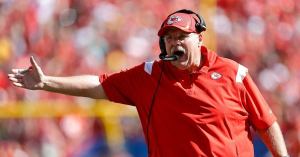Another NFL star has opted out of the upcoming 2020 season due to health and safety concerns. Damien Williams, the running back who scored two touchdowns for the Kansas City Chiefs in Super Bowl LIV, will not join his team as they search for a second straight title. He joins guard Laurent Duvernay-Tardif on the list of players making the choice amid the COVID-19 pandemic.
“Damien Williams informed the club of his decision to opt-out of the 2020 season,” Chiefs GM Brett Veach said in a statement Wednesday. “As an organization, we certainly understand and respect Damien’s choice, knowing it was made in the best interest of his family. He means a lot to our football team as a player and a person, and we’re going to miss having him around this season.”
Videos by PopCulture.com
Without Williams in the building, the Chiefs will rely on a rookie running back to lead the rushing attack. Clyde Edwards-Helaire will take over the starting job after joining the team as a first-round pick out of LSU. Edwards-Helaire rushed for 2,103 yards in three seasons with the Tigers, and the Chiefs will need this playmaking ability during his first season as a pro.
The players only have a limited amount of time to decide about the upcoming season following an agreement between the NFL and the NFLPA. The deadline to opt-out is Monday, and players must provide written notice. There are two designations for players that take this option — voluntary opt-out and higher-risk opt-out.
According to the NFL, a voluntary opt-out player “must be under contract or subject to a tender. The player’s contract will toll, and all provisions of that contract for the tolled year will be applicable the following season; however, he will not receive an accrued season.” The player will receive a stipend of $150,000, which will be a salary advance on his contract.
The higher-risk players, on the other hand, must have a diagnosis in their medical records that shows a factor based on the Center for Disease Control’s risk factor list, such as: cancer; chronic kidney disease; COPD (chronic obstructive pulmonary disease); immunocompromised state from solid organ transplant; serious heart conditions, such as heart failure, coronary artery disease, or cardiomyopathies; sickle cell disease; type 2 diabetes mellitus; asthma; cerebrovascular disease; cystic fibrosis; hypertension or high blood pressure; immunocompromised state from blood or bone marrow transplant, immune deficiencies, HIV, use of corticosteroids, or use of other immune weakening medicines; neurologic conditions, such as dementia; liver disease; or pulmonary fibrosis. Players on the higher-risk list will receive a stipend of $350,000, as well as an accrued season toward free agency.”





